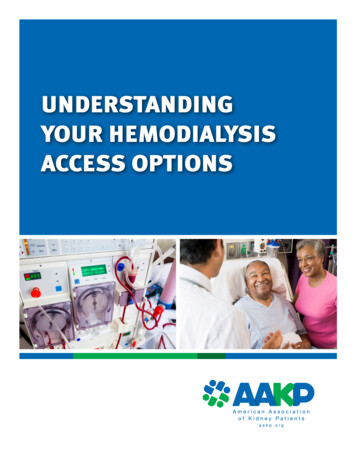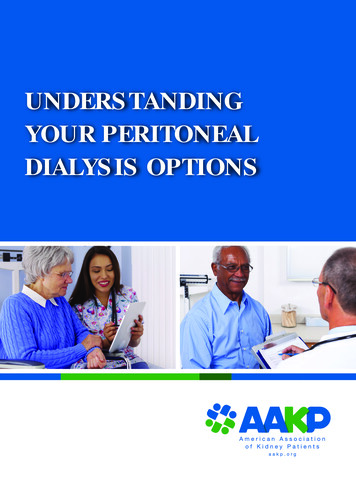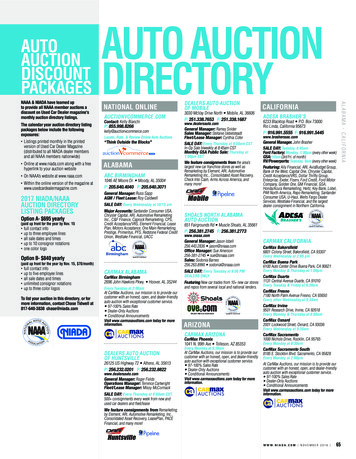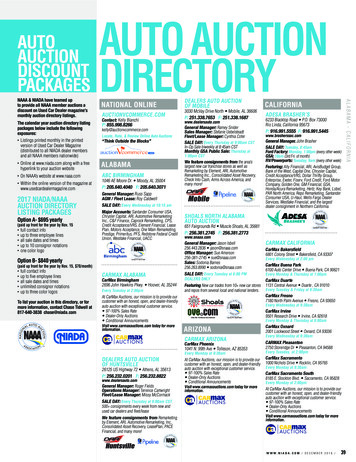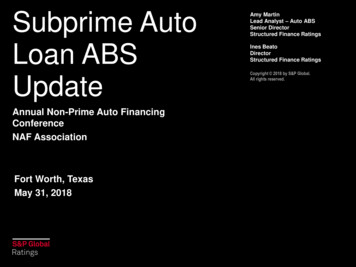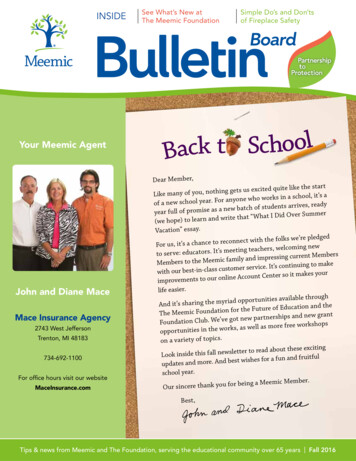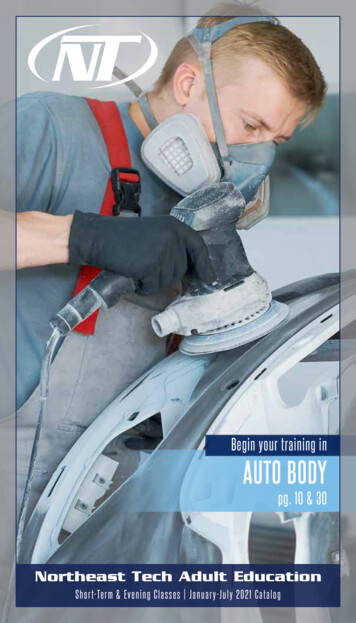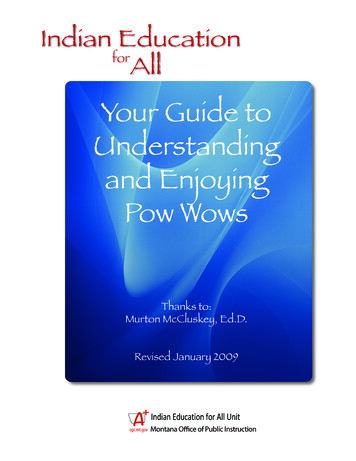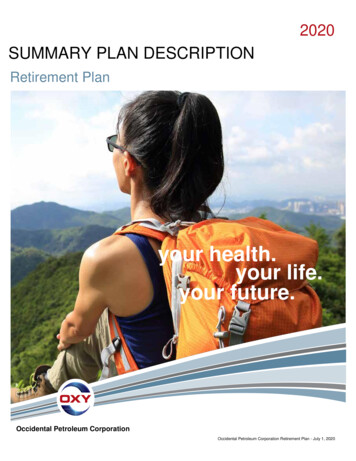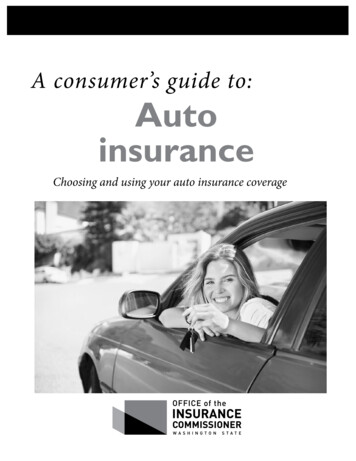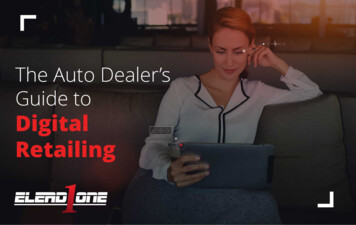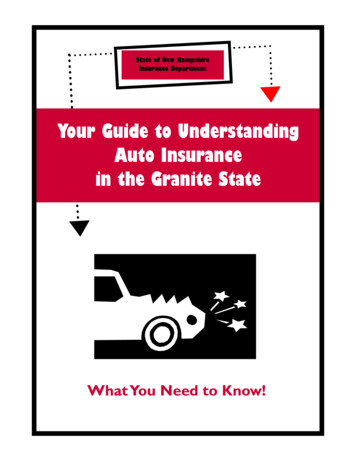
Transcription
State of New HampshireInsurance DepartmentYour Guide to UnderstandingAuto Insurancein the Granite StateWhat You Need to Know!
This guide is intended to give New Hampshire consumers basicinformation on auto insurance.It suggests ways to:Lower the cost of your auto insurance, shop for Auto insurance and, filean auto insurance claim.If you have questions or need help after reading this guide, please feelfree to contact the New Hampshire Insurance Department at thenumber and address in the back of this guide.ABOUT USThe New Hampshire Insurance Department makes sure that insurers doingbusiness in the state are financially sound, insurance is available andappropriately priced, and consumers are treated fairly by doing the following: Licensing insurance companies and checking the financial stability of theinsurance companies Reviewing insurance forms and premium rates to be sure they comply withstate law Licensing individual insurance producer/agents and brokers as well asinsurance agencies Helping consumers with questions and problems Ensuring that insurers and producer/agents are in compliance with stateinsurance laws Educating the public about insurance issues Advocating reforms that protect the insurance-buying publicIt should be noted that the New Hampshire Insurance Department reviews andapproves rating plans submitted and justified by insurance companies. The NewHampshire Insurance Department does not mandate or set Auto InsuranceRates. Auto Insurance Rates will vary by insurance company.
TABLE OF CONTENTS1. Choosing the coverage you need .1Why buy Auto Insurance?What coverage should I buy?How much coverage should I buy?2. Factors affecting the premium paid by you 4Underwriting, rating, and premiums.Some factors companies use to set rates.Discounts.3. Shopping for the best value 6Getting rate quotes.Buying insuranceGive accurate information.4. Filing an auto insurance claim .8What information must I provide when I file a claim?Filing a claim with your insurance company.Filing a claim with the other driver’s insurance company.5. Frequently asked questions .106. What if you have a problem? . .15First, contact your agent/producer or insurance company, then, if you feelthat your problem is not resolved in a fair manner or as prescribedyour policy, Contact the New Hampshire Insurance Department.
C H O O S I N G THE COVERAGE YOU NEEDWhy Buy Auto Insurance?If you are in an auto accident and you are at fault, you could be held liable (legallyresponsible) for bodily injury or property damage resulting from that accident. If alawsuit is brought by the injured party, a court could order that your assets be usedto pay for the resulting damages that are awarded. Even for an accident where youwere not at fault or were only partially at fault, the costs of defending yourselfagainst a legal action could be very high.What if you are involved in an auto accident where the other party is at fault, butthey have no money, no insurance, or inadequate insurance and you are injured?Even regarding an accident where you are not at fault you could incur substantialmedical and other costs. In New Hampshire, Auto Insurance Policies providecoverage that would respond to such situations.And don’t forget the damage to your own auto as well. You will need to repair yourauto in the event of an accident or other type of property damage loss. This will bepaid by you unless you have the proper coverage available under Auto Insurance.New Hampshire Motor Vehicle Laws do not require you to carryAutoInsurance, but you must be able to demonstrate that you are able to providesufficient funds to meet New Hampshire Motor Vehicle Financial ResponsibilityRequirements in the event of an “at-fault” accident. If you are unable to meet theserequirements your driving privileges in New Hampshire may be suspended. Formore information on financial responsibility requirements you can refer to NewHampshire Statute RSA 264 or contact the New Hampshire Division of MotorVehicles at 603-271-3101 or www.nh.gov/safety/dmv.What Coverage Should I Buy?Liability Coverage pays for damages to others for which you are legally liable. If youbuy Auto Insurance in New Hampshire, the minimum limits available for LiabilityCoverage are 25/50/25, or 25,000 per person for bodily injury, up to 50,000 if 2 ormore persons are hurt, and up to 25,000 for property damage.Liability Coverage does not pay to repair damage to your own auto. This type ofinsurance is called Collision (damage due to contact with another auto or object)and Comprehensive (damage incurred due to reasons other than a collision)Coverage.Per New Hampshire Statutes, NH RSA 264:16, if you buy Auto Insurance forpersonal use, you must also buy Medical Payments Coverage. Medical PaymentsCoverage pays for medical expenses incurred as a result of an automobile accident(regardless of fault). By law, you must buy at least 1,000 of Medical PaymentsCoverage.1
Per New Hampshire Statutes, NH RSA 264:15, if you buy Auto Insurance you mustalso purchase Uninsured Motorists Coverage. Uninsured Motorists Coverageprovides coverage should injuries result from an accident involving an at-faultuninsured driver, or a hit and run driver. It also protects against injuries caused byinsured drivers whose coverage is less than your own. In New Hampshire,Uninsured Motorists Coverage must be provided at limits equal to your AutoLiability Coverage.You do not have to buy Collision Coverage or Comprehensive Coverage to protectyour autos, unless you are obligated by your lender. If you do not purchasecoverage for either or both of these options, you will need to personally fund anyrepair to your auto made necessary due to collision with another auto or a normallycovered non-collision loss.Common Types of Coverage AvailableThe following types of coverage are generally available in New Hampshire: Auto Liability Coverage – This provides coverage for liability incurred as theresult of an auto accident caused by you. It also covers expenses for a lawyer todefend you should that become necessary. There are two kinds of liabilitycoverage: Bodily Injury and Property Damage Bodily Injury Liability Coverage – This coverage pays for claims made as theresult of injury to others resulting from an accident you cause. It compensatesothers for pain, suffering and economic damages, such as lost wages. Property Damage Liability Coverage - This coverage pays for damage toanother auto or property of others incurred as the result of an auto accidentcaused by you. Uninsured or Underinsured Motorist Bodily Injury Coverage - Thiscoverage pays for injury to you if you are involved in an accident involving anautomobile driven by an individual who is uninsured or underinsured and who isfound to be liable for your damages. Medical Payments Coverage – This coverage pays for medical costs incurredas a result of injuries sustained in an accident without regard to fault. Thiscoverage will pay for covered expenses up to one year (this time-frame mayvary by insurance company) following the date that the injuries are sustained. Collision Coverage – This coverage pays for damage to your auto when itcollides with another auto or object. This coverage is generally required by alender, if a loan is obtained on your vehicle.2
Comprehensive Coverage – This coverage pays for damage to or theloss of your auto from causes other than collision (for example: hail,vandalism, fire, theft, etc.). This coverage is generally required by alender, if a loan is obtained on your auto. Towing and Labor Coverage – This coverage reimburses you fortowing expenses when your auto becomes disabled and requiresroadside assistance. Rental Reimbursement/Transportation Expenses – This coverage, ifprovided, pays a specified amount for help in covering the necessaryrental of a substitute auto while yours is being repaired. This coverageapplies for a limited period of time and is referenced in your policyconditions.How Much Coverage Should I Buy?An immediate problem in determining how much coverage to buy is that noone plans to have an accident. It is a “what if” consideration.Unless you have an accident, you will never experience the benefits of AutoInsurance. Predicting the future is impossible. You can not tell if and whenyou might be involved in an accident, how much damage there might be, or ifthe other driver will be insured. The Auto Liability Coverage Limits youchoose should be high enough to protect you from the potential loss of yourassets due to Bodily Injury and Property Damage Claims that may be madeagainst you as the result of an accident.Bodily Injury and Property Damage Claims can easily be higher thanminimum coverage levels since autos now cost many thousands of dollarsand medical costs have soared. To choose the level of coverage for AutoLiability and Property Damage, think about what you could lose. In NewHampshire, Uninsured and Underinsured Motorist Coverage would beincluded in any purchase of Auto Liability Coverage as coverage is providedat the same limits.Even if you do not yet have significant assets, having adequate coveragewould help avert incurring significant debt that might make obtaining assetsin the future more difficult.3
FACTORS AFFECTING THE PREMIUMUnderwriting, Rating and Premiums:Underwriting and rating determine what you pay for Auto Insurance.Insurance Companies analyze the level of exposure or risk by reviewingmultiple factors, including claim history and motor vehicle records of you andother household drivers to decide how much risk you present. Credit historymay also be taken into consideration.As a result of the underwriting process, the driving exposures presented, andthe corresponding claims data, insurance companies develop rates andsubmit (file) their rating plans to the New Hampshire Insurance Departmentfor approval for use in New Hampshire. Your cost reflects the insurer’sestimate of the cost to assume financial responsibility for the exposure toauto accidents.When you apply for insurance you will be asked a number of questions. Thepurpose of these questions is to aid in risk assessment and to helpdetermine the amount of premium you will be charged.Some Factors Companies Use to Determine Rates Include: Age, Gender and Marital Status – (i.e., a single 17 year old male vs. amarried 45 year old female). Historical trends indicate that certain groups ofdrivers have more accidents. The greater the chance a group of drivers willhave a loss, the higher the cost of the premiums (or “rating”) for that group. Coverage Limits - The price that you pay will reflect the level of coveragethat you purchase. Higher coverage limits cost more than lower coveragelimits. Household Members - The ages and driving records of other drivers inyour household will likely affect your premium. If you have teenage driversand your policy covers them, your premium will increase for that reasonwhether or not they ever or rarely drive your autos. It may be possible toavoid many of the effects on your policy premium, if the teen driver buystheir own policy. It is critical that you notify your insurance company of alllicensed (or permit) drivers in your household that may be considered to bean exposure under your Auto Insurance Policy. Location - The price that you pay will be affected by where you garageand drive your car. Drivers in heavily populated areas often pay more thanrural drivers because of more traffic activity and an increased exposure toaccidents, theft, and vandalism.4
Type of Auto - The price that you pay will be affected by the characteristics ofthe auto that you drive. Model (standard versus high performance, for instance),model year, and value of your car influence the premium charged. Some autoscost more to insure because they are more easily damaged, more expensive torepair, or more likely to be stolen. Use of the Auto - The price that you pay will be affected by how your auto isused. For instance, your daily usage may exceed set criteria for mileage (suchas commuting a long distance to work each day). Credit history – Many companies review your credit history. Insurancecompanies may apply adjustments to your rate that take your credit score orattributes of your credit history into consideration.Discounts:You may be eligible for discounts which are part of the insurance company’srating plan that can serve to reduce your premiums. Be sure to ask aboutpossible discounts when buying or renewing your auto insurance policy.Examples of possible discounts are:Anti-theft devices - This may be offered as a discount on your ComprehensiveCoverage Premium for devices that discourage theft or vandalism. Auto/home packages – This may be offered if you buy both your Auto andHomeowners Policies from the same insurance company. Good driver – This may be offered to policyholders who maintain a gooddriving record. Good student – This may be offered to youthful drivers who maintain aspecified grade point average. Low annual mileage – May be available for vehicles operated less than aspecified number of miles per year. Multiple vehicles – This may be offered when the same company insuresmore than one autoin your household.Not all companies offer all of the discounts listed here. Some companies mayoffer more or less discounts than those listed above.5
SHOPPING FOR THE BEST VALUEGetting Rate Quotes:One way to make sure that you are getting the best available premium for yourAuto Insurance is to request premium quotes. This can be requested from yourcurrent producer/agent as they likely represent more than one company or you mayseek a quote from another producer/agent or company.After you receive alternative quotes and you compare prices, make sure that youare comparing the coverage and price offered on an apples-to-apples basis. Youshould take note of the difference in coverage as that may explain differences inprice or it may reveal that one company is willing to offer more coverage for asimilar price. Remember to inquire about the types and amounts of discounts thatmight be offered and whether the premium quote includes any discounts.One area you may want to check on is the deductible listed in the quote. Adifference in the deductible does make a difference in the premium that you may becharged. If you increase the deductible, you are likely to pay a lower premium.Remember, however, with a higher deductible you will pay more out of pocketshould you have a claim.The rate quote obtained from an insurance producer/agent is an estimate of whatyou will pay for the insurance based on the information that you have provided atthe time of the quote. While you are evaluating your options, It is a good idea toavoid binding coverage before you make the decision to switch Auto Insurancecompanies. Be aware that, if you choose to cancel your policy before it expires,there may be a premium penalty which must be weighed in your decision (refer toyour current policy terms regarding cancellation).Buying InsuranceYou may buy insurance from an independent insurance producer/agent whorepresents multiple companies, or from an exclusive insurance producer/agent whorepresents one company.An independent producer/agent earns commissions on sales of insurance products.An independent producer/agent represents and sells the insurance products ofseveral, unrelated insurance companies.An exclusive producer/agent represents only one insurance company (or group ofrelated insurance companies), and places all of their policies with that company (orgroup of related companies). This type of producer/agent earns commissions orsalary directly from that company (or group of related companies).6
In addition to making sales, it’s also a producer/agent's job to offer advice based onyour needs and to provide service after the sale.No matter where or from whom you buy your insurance, be sure to buy only fromlicensed individuals or companies. To legally sellinsurance in New Hampshire, producer/agents andcompanies must be licensed by the New HampshireInsurance Department. The licensing process givesconsumers certain safeguards by, among otherthings, making sure that applicants for licensure havemet basic financial, educational, and backgroundrequirements under the law. Not all companies thatadvertise nationally or sell on the Internet arelicensed to do business in New Hampshire. If you have any concern in this regard,you can visit the New Hampshire Insurance Department web-site at www.nh.gov/insurance or contact us directly at 1-800-852-3416.Give Accurate Information:No matter how you buy insurance, it’s important that you provide accurateinformation to the procucer/agent acting on behalf of the insuring company.Complete your insurance application fully and truthfully. If you leave out information,or you do not provide accurate information, there may be adverse repercussions inthe event of a claim.Know what you’re buying before you commit yourself. Ask for a clear and detailedexplanation and get the parameters of coverage in writing. Once you receive thepolicy, make sure it’s what you intended to buy.If you apply for and/or buy insurance over the phone, ask the representative to senda copy of the application to you for your records. Ask for the name and title of theperson you speak with, then verify both the answers that you have given and theexact types and amounts of coverage you have agreed to buy.If you apply for insurance via the Internet, be sure to print a copy of your on-lineapplication for your records. Correct any errors right away. Many commercial websites now offer rate comparisons and instant on-line price quotes based on theapplication you fill out on-line. If you decide to buy a policy through a web site, youmay, or may not be communicating with a producer/agent. Talking with a producer/agent is recommended.Should you choose to deal through a producer/agent, a good producer/agent willanswer your questions and be available if you need them.Exercise care in your choice as it will prove to be beneficial. Choose wisely.7
Filing an Insurance ClaimIf you are involved in an accident, it may be necessary to file an insuranceclaim.If the other driver caused the damage, you can file the claim with either yourown insurance company (a “first-party” claim) or the other driver's insurancecompany (a "third-party" claim). If you file a first-party claim under PhysicalDamage Coverage afforded by your policy, your insurance policy requiresyour insurance company to meet all the conditions in your policy. In a thirdparty situation, you do not have a direct contract with the other driver’sinsurance company. Please be aware that their primary obligation is to theirown policyholder.It will most likely be to your ultimate benefit to file with your own company first.While you may be responsible for a deductible under your own policy, shouldthe other driver be at fault, you will likely be reimbursedif your company successfully receives payment from theat-fault party’s insurer. It may be quicker to deal with theother carrier if they agree that their driver is at fault, butit will take much more time if they do not. The key iswhether you want to do the chasing or whether you wantyour insurance company to do that for you. As yourinsurance company has more resources and experiencein doing the chasing, going to your own company might be the better choice.What Information Must I Provide ? How, when and where the accident or loss happened, including thenames and addresses of any injured persons and any witnesses. Copies of any notices or legal papers you receive about the accidentor loss. Documents related to the claim, such as medical and auto repairbills, a copy of the police report, or a bill of sale for the auto.8
Filing a Claim With Your Own Insurance Company Immediately report all losses directly to your insurance producer/ag
Hampshire Insurance Department does not mandate or set Auto Insurance Rates. Auto Insurance Rates will vary by insurance company. This guide is intended to give New Hampshire consumers basic information on auto insurance. It suggests ways to: Lower the cost of your auto insurance, shop for Auto insurance
